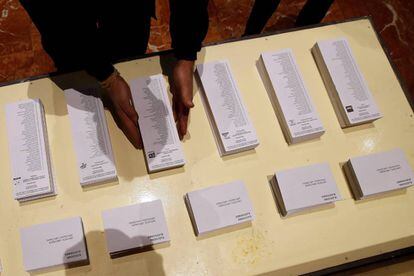A free Catalonia
A regional government is being voted in so it will govern for four years, not for a return to chaos

The election being held in Catalonia today should mark a milestone in the region’s gradual return to normality. This is a regional election that will award legitimacy to a new legislature in the Catalan parliament for the next four years, and to the government that emerges from it so that it can exercise all the basic functions of any Catalan administration.
The best option for voters is not those who provoked the chaos but those who respect constitutional and statutory order
This is an appeal to the key mechanism of democracy: the ballot boxes made available in a legal manner under the rule of law. And it is also an appeal to their final owners, the people, so they may set the course of their immediate future at a particularly difficult time.
But it is nothing more and nothing other than that: it is not a return to judicial insecurity nor a return to the systematic violation of the democratic order. It is not a confirmation of any type of separation or of any kind of alternative regime. Nor is it a restoration of a previous authority holding onto power by some kind of miraculous divine right or automatic inheritance.
The parliamentary attack of September 6 and 7 against the Catalan Statute and the Spanish Constitution through the use of self-made laws constituted a coup d’état, lacked any judicial legitimacy, and was orchestrated by authorities without the power or legitimacy to do so. As such, the Constitutional Court struck down the unlawful legislation.
The subsequent temporary intervention in the self-government of Catalonia was the second step towards bringing things back to normal. This intervention has prudently been limited to calling today’s election, after the former premier shirked his own duty to call the vote as he had promised to do, instead going back on his word and fleeing the country.
The election being held in Catalonia today should mark a milestone in the region’s gradual return to normality
There have been other cases of intervention in a regional government in Europe, notably in the United Kingdom and, in a certain manner, in Italy after Padania’s Declaration of Independence in the 1990s. The claims of victimhood on the part of the Catalan pro-independence movement who says this has never happened before are strictly false.
The claim that one executive has been imprisoned by another is also false; that would certainly be a first. It didn’t happen that way: it was the judicial system that initiated proceedings against certain leaders for allegedly criminal behavior, and ordered pre-trial custody for four (not all) of them. What is indeed happening in Europe for the first time is that a regional government – in this case one that enjoys very high levels of autonomy – has risen against the democratic legality that was at its foundation. Without this illegal precedent there would have been no need to restore the legality which has been damaged.
The most urgent tasks of the new Catalan parliament, the new regional government and the new premier of Catalonia will be to heal social division, get the economy back on track, and restore the confidence that has been damaged by the breakdown of judicial security. As many citizens as possible must now go out and vote, and they must do so keeping in mind that when it comes to restoring normality and assuring that Catalonia is spared secessionist nightmares, the best option is not voting for those who provoked the chaos in the first place, but those who respect constitutional and statutory order.
The way this election goes will determine how quickly these tasks are performed, and whether Catalonia returns to its historic role as an economic engine and a modernizing force in Spain. This, unfortunately, is not something that is assured at this time: it depends to a great degree on what voters do today.
English version by George Mills.










































